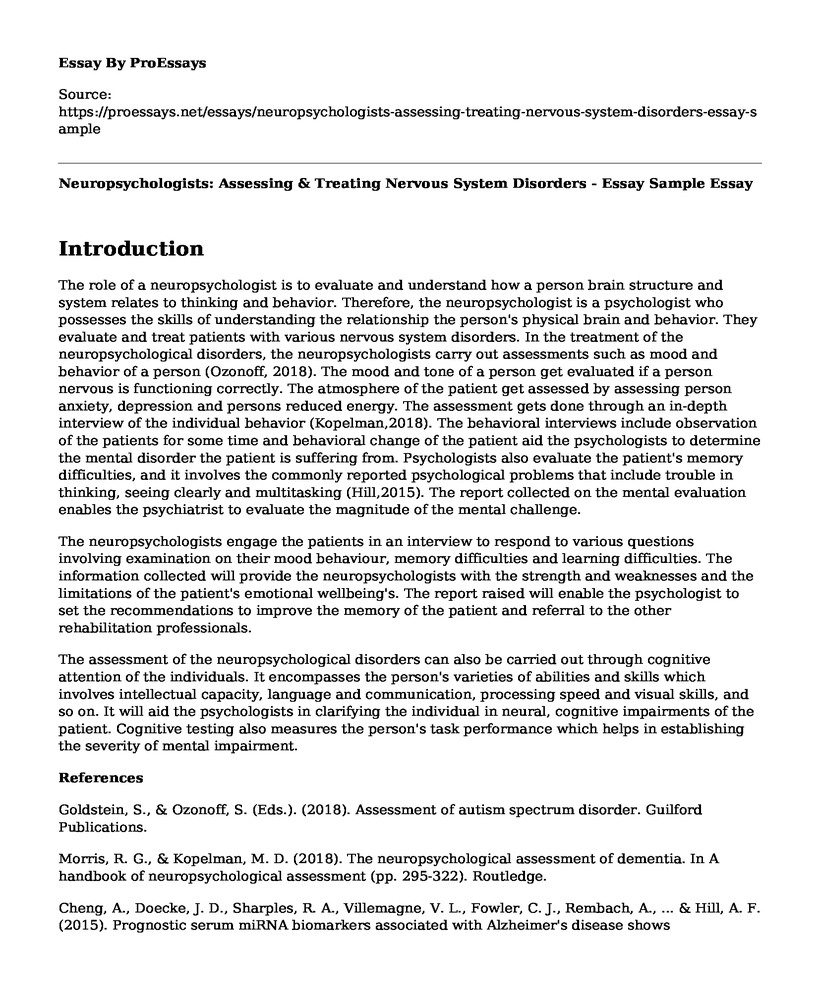Introduction
The role of a neuropsychologist is to evaluate and understand how a person brain structure and system relates to thinking and behavior. Therefore, the neuropsychologist is a psychologist who possesses the skills of understanding the relationship the person's physical brain and behavior. They evaluate and treat patients with various nervous system disorders. In the treatment of the neuropsychological disorders, the neuropsychologists carry out assessments such as mood and behavior of a person (Ozonoff, 2018). The mood and tone of a person get evaluated if a person nervous is functioning correctly. The atmosphere of the patient get assessed by assessing person anxiety, depression and persons reduced energy. The assessment gets done through an in-depth interview of the individual behavior (Kopelman,2018). The behavioral interviews include observation of the patients for some time and behavioral change of the patient aid the psychologists to determine the mental disorder the patient is suffering from. Psychologists also evaluate the patient's memory difficulties, and it involves the commonly reported psychological problems that include trouble in thinking, seeing clearly and multitasking (Hill,2015). The report collected on the mental evaluation enables the psychiatrist to evaluate the magnitude of the mental challenge.
The neuropsychologists engage the patients in an interview to respond to various questions involving examination on their mood behaviour, memory difficulties and learning difficulties. The information collected will provide the neuropsychologists with the strength and weaknesses and the limitations of the patient's emotional wellbeing's. The report raised will enable the psychologist to set the recommendations to improve the memory of the patient and referral to the other rehabilitation professionals.
The assessment of the neuropsychological disorders can also be carried out through cognitive attention of the individuals. It encompasses the person's varieties of abilities and skills which involves intellectual capacity, language and communication, processing speed and visual skills, and so on. It will aid the psychologists in clarifying the individual in neural, cognitive impairments of the patient. Cognitive testing also measures the person's task performance which helps in establishing the severity of mental impairment.
References
Goldstein, S., & Ozonoff, S. (Eds.). (2018). Assessment of autism spectrum disorder. Guilford Publications.
Morris, R. G., & Kopelman, M. D. (2018). The neuropsychological assessment of dementia. In A handbook of neuropsychological assessment (pp. 295-322). Routledge.
Cheng, A., Doecke, J. D., Sharples, R. A., Villemagne, V. L., Fowler, C. J., Rembach, A., ... & Hill, A. F. (2015). Prognostic serum miRNA biomarkers associated with Alzheimer's disease shows concordance with neuropsychological and neuroimaging assessment. Molecular psychiatry, 20(10), 1188.
Cite this page
Neuropsychologists: Assessing & Treating Nervous System Disorders - Essay Sample. (2023, Mar 17). Retrieved from https://proessays.net/essays/neuropsychologists-assessing-treating-nervous-system-disorders-essay-sample
If you are the original author of this essay and no longer wish to have it published on the ProEssays website, please click below to request its removal:
- The Pathophysiology of Atherosclerosis, and Hypertension, and Their Current Treatment Regimens
- What Is the Best Way to Reduce Postoperative Questions and Shorten Hospital Stay in Surgical?
- Essay Example on Mass Media: Essential Agents of Socialization and Mental Health
- Essay Example on Hearing Loss: Causes, Treatments, and Benefits
- Diabetes Mellitus: Type 1 Overview & Stats - Essay Sample
- Social Experiments and Authority Dynamics: Unveiling Human Behavior and Challenges in Leadership - Report Example
- Essay Sample on Types of Procrastination







